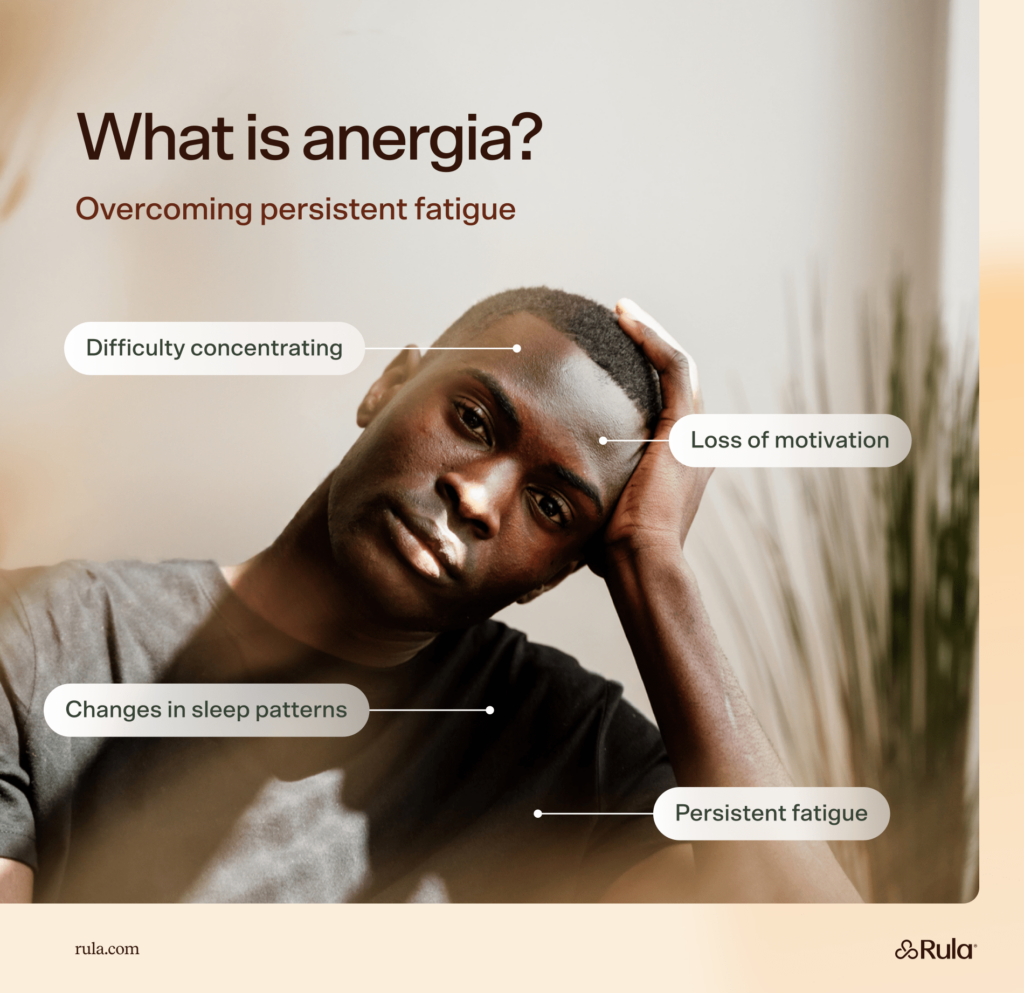Anergia is an extreme lack of energy that is sometimes linked to certain medical and mental health conditions like depression.
Unlike the common, everyday fatigue we all experience from time to time, anergia causes persistent, chronic fatigue that can interrupt your ability to function in daily life.
The first step in treating anergia is seeking a professional evaluation. A medical or mental health professional can identify the underlying cause of your anergia and create an effective treatment plan to help you improve your energy level and quality of life.
Everyone experiences fatigue or exhaustion from time to time. Maybe your work schedule has changed. Or perhaps you have a new baby at home. You might be staying up late to study or because you have a lot on your mind.
No matter the reason, not getting enough rest is something we all face occasionally. But being tired all the time can make even the simplest tasks seem more difficult. It can also take a toll on your mental and physical health and your relationships.
If your energy levels consistently remain low enough to impact your daily life, no matter how much sleep you get, it might be time to seek a professional evaluation. An extreme lack of energy is sometimes referred to as anergia and this experience is tied to certain medical and mental health conditions.

What is anergia?
According to the American Psychological Association, anergia is defined as “the absence of energy.” But unlike occasional tiredness or fatigue, anergia is often a sign of clinical depression. Research shows that 90% of people who live with major depressive disorder experience fatigue even after taking medication.
If you find yourself without the energy or motivation to attend to required tasks, engage socially, or connect with friends and family, it might be time to talk to a medical or mental health professional. They can conduct a thorough evaluation to determine the cause of your anergia and create a treatment plan to address your energy level and any other concerns.
The care you need, when you need it
Learn how Rula can support your mental health journey
Causes of anergia
There isn’t a single known cause of anergia. But there are a variety of physical, psychological, and lifestyle factors that may put you at greater risk for experiencing a severe loss of energy.
Physical causes: Anergia has been linked to certain heart conditions, thyroid issues, as well as other health concerns such as kidney dysfunction, arthritis, lung disease, and anemia.
Psychological causes: Anergia is one of the most common signs of clinical depression and has also been linked to schizophrenia.
Lifestyle factors: Your energy level can be affected by your lifestyle and other environmental factors. For example, not getting adequate nutrition or exercise can lead to anergia.
Symptoms of anergia
The pervasive, chronic lack of energy associated with anergia can take many forms. But some of the most common signs and symptoms of anergia include:
Persistent fatigue: A constant, severe state of tiredness that persists no matter how much you sleep
Loss of motivation: A decreased desire to do things or engage in activities you used to enjoy
Difficulty concentrating: You struggle to focus on tasks and it’s difficult to complete them
Changes in sleep patterns: You sleep too much or not at all, or you struggle to fall or stay asleep
Left untreated, these symptoms can have a serious impact on your daily life, health, and relationships. They can lead you to struggle with tasks and responsibilities at home, work, or school and this can negatively affect your professional or academic performance. A loss of motivation can cause you to withdraw from activities and people you care about and this can damage important relationships.
Chronic anergia can also take a toll on your physical health. Feeling constantly tired can exacerbate existing health issues and put you at greater risk of developing a sleep disorder such as insomnia.
Diagnosing anergia
If you or someone you care about is struggling with extreme tiredness, know that you’re not alone and that help is available.
One of the first and most important steps in getting help for anergia is seeking a diagnosis from a medical or mental health professional. They will listen to your concerns and ask you questions about how your energy level is impacting your daily functioning. You’ll discuss your medical and social history and talk about when your symptoms first started and what might seem to make them better or worse.
It’s likely that your provider will conduct a depression assessment to determine whether or not your anergia might be a sign that you’re living with clinical depression. They may also ask you to get a blood test or other physical evaluation to determine whether or not your anergia might be caused by an underlying medical concern.
Treating anergia
After receiving a formal diagnosis from a medical or mental health professional, you and your provider can work together to create a treatment plan to address your anergia.
Depending on the cause of your fatigue, this might include medical interventions and medications, lifestyle changes including diet and exercise habit shifts, and psychological supports like therapy.
Your provider may also give you some suggestions for self-management and prevention. This might include stress-reducing techniques like mindfulness meditation, creating a bedtime routine to support good sleep hygiene, strengthening your support network, or other daily changes that can help restore your energy levels.
Find support for anergia with Rula
If a persistent lack of energy and motivation is negatively affecting your life, know that you’re not alone and that help is available. Anergia can be managed with the right support.
By partnering with a therapist in the Rula network, you can get to the root cause of your anergia and take meaningful steps toward improving your energy level and quality of life.
When you’re ready, Rula can match you with a therapist who takes your insurance in just a few seconds so that you can begin treatment this week. And if medication ends up being a part of your treatment journey, Rula can connect you with psychiatric care too.
Find therapists near you
San Diego, CA – Joliet, IL – Dallas, TX – Tampa, FL – Greensboro, NC – Find your city
Rula's editorial process
Rula's editorial team is on a mission to make science-backed mental health insights accessible and practical for every person seeking to better understand or improve mental wellness.
Members of Rula’s clinical leadership team and other expert providers contribute to all published content, offering guidance on themes and insights based on their firsthand experience in the field. Every piece of content is thoroughly reviewed by a clinician before publishing.





